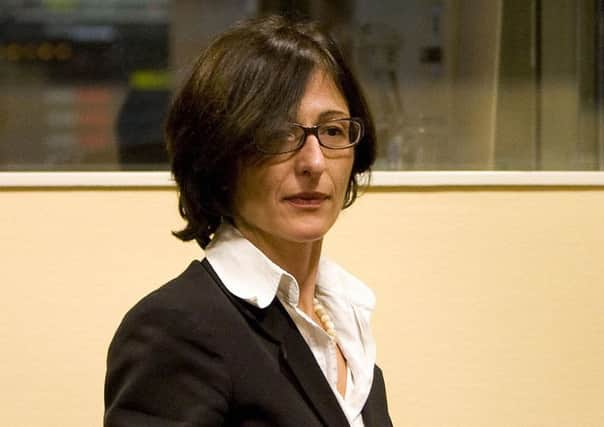Martyn Mclaughlin: Punishing Bosnian Serb trials reporter is an outrage


The genocide cast a shadow over the continent, with its perpetrators lurking in the darkness as the long quest for justice began.
In the years since, many of those responsible have been brought before the International Criminal Tribunal for the Former Yugoslavia (ICTY) to answer for their crimes, the most recent being Radovan Karadžić, last week sentenced to 40 years in prison.
Advertisement
Hide AdAdvertisement
Hide AdThe successful prosecution of the chief architect of some of the worst barbarities of the Balkans War was hailed as a triumph for the agonisingly slow and imperceptible system of international justice.
What a shame it is that The Hague court has now undermined this hard won victory by choosing to vilify an individual who has worked tirelessly to shed light on one of the bloodiest chapters in the history of modern Europe.
The journalist, Florence Hartmann, spent six days in isolation after being jailed by the war crimes tribunal last week. As a result, the former Le Monde correspondent found herself in the extraordinary situation of being cheek by jowl with those individuals she has sought to bring to justice.
In a telephone call from her solitary cell, she described the absurd scene before her, with Ratko Mladić, the so-called Butcher of Bosnia, wandering around the exercise yard. Her lawyer, Guénaël Mettraux, has said she is being segregated on suicide watch, with the light in her cell kept on 24 hours a day. Such conditions may be appropriate for the antagonists who spilled so much blood in the Balkans, but in the eyes of the tribunal, they were just as fitting for those who fight for transparency.
The ICTY has adjudged Ms Hartmann’s duty to be a crime, punishing her for contempt of court. The case hinges on three pages of her 2007 book, Peace and Punishment, where she alleges that a tranche of documents detailing Serbia’s role in the massacre were handed over to the tribunal.
Crucially, she did not disclose the content of the paperwork, only the conditions by which they came into the ICTY’s possession; firstly, that they were to remain secret and secondly, were to used only in the trial of Slobodan Milošević.
Under the terms of the arrangement, Ms Hartmann claimed, the documents could not be used in a separate trial at the International Court of Justice, where Bosnia unsuccessfully sued the Serbian state for genocide. In her estimation, the confidentiality deal existed “for the sole purpose of shielding Serbia from responsibility before another UN court.”
Having been convicted in 2009, a ruling that was upheld on appeal, France refused a request to extradite Ms Hartmann, a former aide to the tribunal’s prosecutor’s office. It was only last week that, awaiting the Karadžić verdict, she was seized. Demonstrators and supporters gathered outside, many of them from Srebrenica, tried in vain to stop UN security guards and Dutch police from apprehending her. Since then, there has been silence from the ICTY and the UN.
Advertisement
Hide AdAdvertisement
Hide AdBernard-Henri Lévy, the French philosopher and human rights activist, is among many who believe the decision has fatally undermined the court’s purpose. “To confuse the killers and those who fought against them is a complete reversal of the values it is supposed to defend,” he said.
Around 100 human rights activists and journalists from the Balkans also expressed support for Ms Hartmann. In a joint letter, they argue that while her actions may be contrary to the ICTY’s statutes, they are “certainly not contrary to justice”.
It is only right that the ICTY should try to maintain the integrity of its judicial process, but such an argument falls way short in the case of Ms Hartmann. Her disclosure was measured, responsible and overwhelmingly in the public interest.
The fact she was released yesterday after serving six days of a seven day sentence is also immaterial. What matters is the tribunal’s insistence on eroding its precious credibility in order to save face.
The ICTY endured a difficult few years following its inception in 1993, with interminably long delays in arresting key suspects and allegations of political interference. Still it has eked its way towards its delivering justice, indicting 161 individuals for serious violations of humanitarian law, 80 of whom have been convicted.
With proceedings ongoing against 12 accused, the tribunal is nearing the completion of its mandate and, according to its website, intends to spend its final years “concentrating on the prosecution and trial of the most senior leaders”.
Quite how the disproportionate detention of Ms Hartmann fits into this completion strategy is a mystery. One suggestion of how the ICTY might best spend its remaining time would be to press Belgrade to arrest three suspects in a separate contempt case which arose from the trial of Vojislav Šešelj, a Serb nationalist convicted of contempt after disclosing the names and details of protected witnesses.
“Justice is the right to do whatever we think must be done, and therefore justice can be anything,” wrote the Yugoslav author, Meša Selimović. The ICTY must learn from its mistakes.